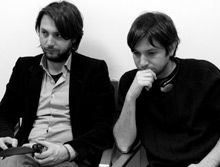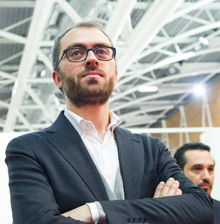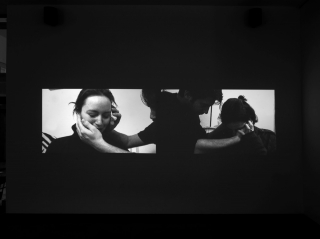The Revolution of the Gaze. Inside the Visible, to grasp the Invisible
The module “The Revolution of the Gaze. Inside the Visible, to grasp the Invisible” is a survey on the spaces of tension and connection between two apparently distant dimensions within the artistic gesture: the political one and the spiritual one.
The field that will be investigated is that of the cinema, and documentary in particular, meant in its various manifestations and formalisations, which is by definition a cinema that glances at reality and brings back a new vision of it, renewed. We will look into the documentary practice, that makes the contact with the reality that one wants to film, the first step towards the creation of a communal act (therefore political). Over the traditional approach of the film on something, the privileged practices will be those that already see during filming an exchange with someone. The man, in this role-play, is at the centre of the gaze. His gestures, his body, his soul.
The module will deal with those cases in which the artist leaves traces of the process of knowledge in the final product, so that the viewer can fill in the gaps with his own experience, as well as the black holes, the questions that the work leaves. The second field of exchange is, therefore, the one established during the movie watching, which makes continuous dialogue and creates a shared memory. Each one takes home a piece of that reality which, made his own and reworked, can then dialogue with the reality of others. In this last, but not final, step there is perhaps the field of tension and combination of the political dimension with the spiritual one. The documentary film, removing someone or something from invisibility and projecting it on the memory of the viewers, takes on a responsibility that belongs to all: to the artist, to the same spectator, to the new community that has been created.
The main objective of the module is to create a discussion around the documentary, its ethical boundaries and expressive possibilities. The module will lay the groundwork for real projects of documentary films, which glance at the reality around Cittadellarte and through which the participants will feel part of a collective creative process of the investigation of reality. The secondary objective of the module will be to provide the tools to deal consciously with the work of the documentary film.
SCHEDULE
July 10th
morning
Guided tour to Cittadellarte (Curated by Elena Rosina), including the Pistoletto, Arte Povera collections and temporary exhibitions.
Introduction to the Theorem of Trinamics, the symbol of the Third Paradise and the concept of Demopraxy.
afternoon
Discussion about some methods of approach to reality: observation and immersion.
Discussion and collective analysis of excerpts from movies.
Hypothesis of a field of research: what and how to observe reality around us? The case study of Biella as an example of stratification and plot between history of industry, history of migrations, human and environmental landscape.
July 11th
morning
Collective brainstorming as method for a “first draft”. We will discuss possible ideas regarding a documentary to be made.
First visit to the surrounding area: the history, the stories. The relationship between individuals and society. Where to focus attention. The choice of point of view (aesthetic and ethical)
afternoon
Collective discussion about the first visit. Division into working groups.
Screening and discussion about film excerpts which relate individual consciousness with the collective one.
July 12th
morning
Deeper brainstorming within the individual working groups. The choice of the best subject to represent the idea.
Second visit. The encounter with the reality to film as a central moment of exchange. Choice of characters: the human at the core of the work.
afternoon
Further collective discussion with a second moment of writing. The hypothesis of a narrative structure. The documentary way "exploded" in space: to think about reality as a fragmented narrative, physical, in progress.
The relationship between art and cinema of reality. Guest: Luigi Fassi.
July 13th
morning
Third visit. Audiovisual notes. The importance of losing your own point of view.
Collective watching and discussion of material gathered from the visit: writing, video, photos. The process of knowledge of reality as the fundament for an “opened documentary”.
afternoon
Screening and discussion about film excerpts of “opened documentaries”.
Focus on the projects of the different groups: to give a “feeling” to your own project, towards the definition and shaping of different ideas.
July 14th
morning
The various groups will be asked to divide tasks internally, and thus create a new community: the film director, the collaborators, the subjects to be filmed.
First shooting. To cross your own idea with the soul of the filmed subject while filming. To look for something which is not seen.
afternoon
Watching of video footage and collective discussion. Hypothesis of a final structure: the reality, forced within the cage of framing and montage, paradoxically finds its freedom again and tells us about something else, something beyond the same reality.
Screening and collective discussion of some of the works of Gianluca and Massimiliano De Serio.
evening
Party.
REFERENCES
The mentor will prepare a reader for participants with key texts, some of which will be discussed during the week. The reader will include pieces by authors, artists, curators and intellectuals, such as:
• Bill Nichols, Introduzione al documentario, Milano, Il Castoro, 2014.
• Guy Gauthier, Storia e pratiche del documentario, Torino, Lindau, 2009.
• Sergio Toffetti (curated by), La scoperta dell'altrove, Milano, Feltrinelli, 2010.
• Jean-Luc Nancy, Abbas Kiarostami. L'evidenza del film, Roma, Donzelli Editore, 2004.
• Alberto Barbera, Elisa Resegotti (curated by), Kiarostami, Milano, Mondandori Electa, 2007.

BIOGRAPHY
Gianluca and Massimiliano De Serio, twins, made their debut with the feature-lenght film Sette opere di misericordia (2011), presented in the international competition at the Locarno Film Festival. I ricordi del fiume (2015) was premiered at the Venice Film Festival. The protagonists of their works, both in movies and installations, are uprooted identities or collective and interstitial identities, within a hybrid path of staging, memory and performance. Among the awards: Don Quixote Award, the Locarno Film Festival; Prix du Jury Meilleure Mise en Scene, Festival of Marrakech; Best Movie, Journées du Cinéma Italien, Nice; Grand Prix Annecy Cinéma Italien; Prize "Navicella" Cinema Italiano; nomination for Nastro d'Argento and David di Donatello; Special Prize at Premio Italia Arte Contemporanea. Among the exhibitions: Whitechapel; Castello di Rivoli; Documenta 13; Fondazione Sandretto; Fondazione Merz; Para/Site, Hong Kong; Henie Onstad Kunstsenter, Hovikkoden; Istanbul Modern; City Gallery, Wellington; Fundacion Proa, Buenos Aires; Belgrade Cultural Centre; Neue Berliner Kunstverein; MAXXI, Rome; Annet Genlink Gallery, Amsterdam; Participant Inc. New York; Manifesta7; Museo del Novecento, Milan; MACRO, Rome; GAM, Torino; Center for Contemporary Art, Tel Aviv. Among the works: I ricordi del fiume, Sette opere di misericordia, Bakroman, L'Esame di Xhodi, Un ritorno, Esecuzione, Looking for Luminita, Stanze, Bakroman, No fire zone.

GUEST
Luigi Fassi has been since 2012 visual arts curator at the Steirischer Herbst Festival in Graz, Austria. He has curated exhibitions for different institutions internationally, including Kunsthalle Helsinki, Finland; Konstmuseum, Malmö, Sweden; Museo Marino Marini, Florence, Italy; GAM-Galleria d'Arte Moderna e Contemporanea, Turin, Italy; Pori Art Museum, Pori, Finland; ISCP, New York, US; Prague Biennale, Prague, Czech Republic. A Helena Rubinstein Curatorial Fellow at the Whitney Museum ISP in New York. In 2008, he was director of the ar/ge kunst Kunstverein in Bolzano (2009–12), where he organised different solo and group exhibitions including Runo Lagomarsino, Chto Delat?, Katarina Zdjelar, Alejandro Cesarco and William E. Jones. From 2010 to 2016 he coordinated and curated "Present Future" at Artissima, a platform presenting solo-shows by globally emerging artists. He is a contributor to Mousse Magazine and Camera Austria has been commissioned different texts for catalogues and books for Alfredo Jaar, Danh Vo, Roman Ondak, João Maria Gusmão + Pedro Paiva, Diango Hernandéz, and others. In 2016 he has been a fellow of the Artis Research Trip Program in Tel Aviv and curator of the XVI Quadriennale in Rome, Italy.
The residency fee includes accomodation, half-board and Arci's Annual Pass Membership.








